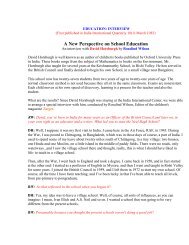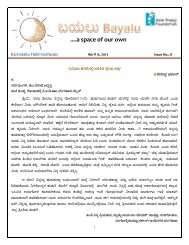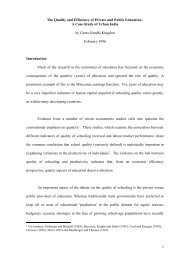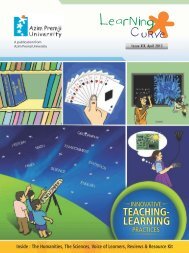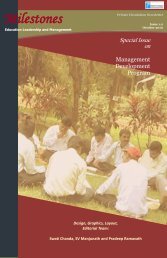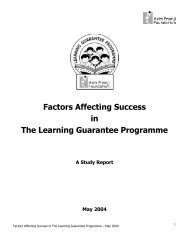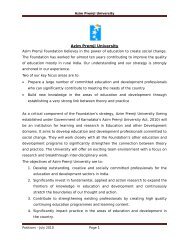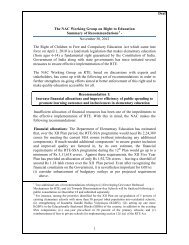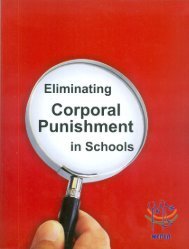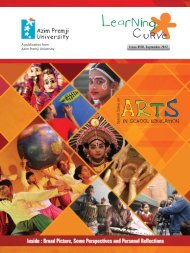Indesign Pagesnew.indd - Azim Premji Foundation
Indesign Pagesnew.indd - Azim Premji Foundation
Indesign Pagesnew.indd - Azim Premji Foundation
You also want an ePaper? Increase the reach of your titles
YUMPU automatically turns print PDFs into web optimized ePapers that Google loves.
put together in what they call as summative assessments.<br />
Summative assessments are akin to the fi nal board exams<br />
(sic). The rest, called formative assessment comprises of<br />
tests, assortment of projects, assignments, homework, class<br />
work, etc to be carried out on a daily, weekly, fortnightly<br />
and monthly basis. 4 On the face of it, these appear as very<br />
progressive and credible act(s). But as I argue these appear<br />
to emerge not in the context of enriching learning but guided<br />
largely in the name of de-stressing students and to take<br />
away the pressure and fear of exams. 5 (Never mind in the<br />
process if teachers are stressed and much of their valuable<br />
time is taken by preparing, fi lling and compiling whole lot of<br />
data) 6<br />
Concerns of de-stressing students and removing fear of<br />
exams hardly do justice to learning. By compromising on<br />
the complexity and intensity of the discipline’s epistemology,<br />
we not only make mockery of exams but mockery of the<br />
subject, learning and schooling itself. The shrill chorus raised<br />
by many in demonizing exams has damaged the inherent<br />
challenge, charms, beauty and reputation of history and<br />
politics if not other subjects.<br />
At one level let me also say that CBSE examination pattern<br />
hardly does credit to the most imaginative, thoughtful of<br />
the textbooks we have on history and politics. The history<br />
and politics textbooks of NCERT are meant to help students<br />
to appreciate history as lot more than mere dates, events<br />
and names. The books are multilayered and more thematic<br />
in their approach. All topics are exploratory in nature and<br />
are deliberately open ended to ensure that both teachers<br />
and students debate on them 7 . In such a case the exams<br />
therefore demand more imagination and depth, goading<br />
students to give answers of insight, profundity, refl ecting<br />
deeper understanding. Alas! When one contrasts the CBSE<br />
papers with NCERT texts, the CBSE pattern of exams appear<br />
so tame and insipid 8 . On the other hand, if we see any of<br />
the textbooks prescribed by ICSE or the TNMB 9 , one will be<br />
forgiven if these texts are mistaken to be guidebooks!! All<br />
chapters are categorized in neatly divided causes, courses<br />
and consequences paradigm. There is little of the how’s<br />
and why-forth’s and even where they are presented, the<br />
arguments put across are neatly packed, self contained<br />
and sealed. These, like I stated earlier, are meant more to<br />
facilitate easy memorizing and consequently scoring.<br />
Ultimately any examination/evaluation makeover is congruent<br />
Section D<br />
Exams: The Need to Restore its Credibility and Sanctity<br />
upon two things – one, changes in textbooks and second,<br />
and more importantly, pedagogy. NCERT has done its bit to<br />
expose children to a qualitatively richer understanding of<br />
history and politics. However, in the fi nal analysis the onus<br />
to help a child rests with teachers and the kind of class<br />
interaction s/he initiates. Teachers with a sound and fi rmer<br />
grasp of history and politics who see society both in its<br />
past(s) and present not in absolutes but more as processes<br />
where they help students with appropriate activities,<br />
classroom discussions etc to explore the interface between<br />
economy, culture, politics and how it determines and shapes<br />
our identities and outlooks. Sadly this is where reforms and<br />
policy changes are not coming. Given the context in which<br />
teaching fi nds itself as the least sought after profession in<br />
urban India, being the worst paid, ridiculed and maligned,<br />
it is no surprise that the best teaching talents are not to<br />
be found here. Consequently, learning suffers. However, the<br />
situation in the rural parts is different. There the issue has<br />
more to do with lack of teacher preparation and motivation.<br />
Concerns of de-stressing students and<br />
removing fear of exams hardly do justice<br />
to learning. By compromising on the<br />
complexity and intensity of the discipline’s<br />
epistemology, we not only make mockery of<br />
exams but mockery of the subject, learning<br />
and schooling itself.<br />
Meanwhile, we do have few teachers and schools, who try<br />
to make exams more challenging and meaningful. However,<br />
owing to the nature of the public exams that are highly<br />
centralized affairs and its grades or marks given so much<br />
of credence by all, such innovation and experiments get<br />
sidelined and focus is once again on ‘examination’ preparation<br />
and ensuring high pass percentages. One may view attempts<br />
by CBSE through their CCE as an effort not only to minimize<br />
the importance of fi nal exams 10 and also as an attempt to<br />
decentralize. The many rubrics that fi ll the data sheet/report<br />
cards suggest that non logico-mathematical intelligence and<br />
emotive constituents in a child’s growth have been factored<br />
Pg No: 115



